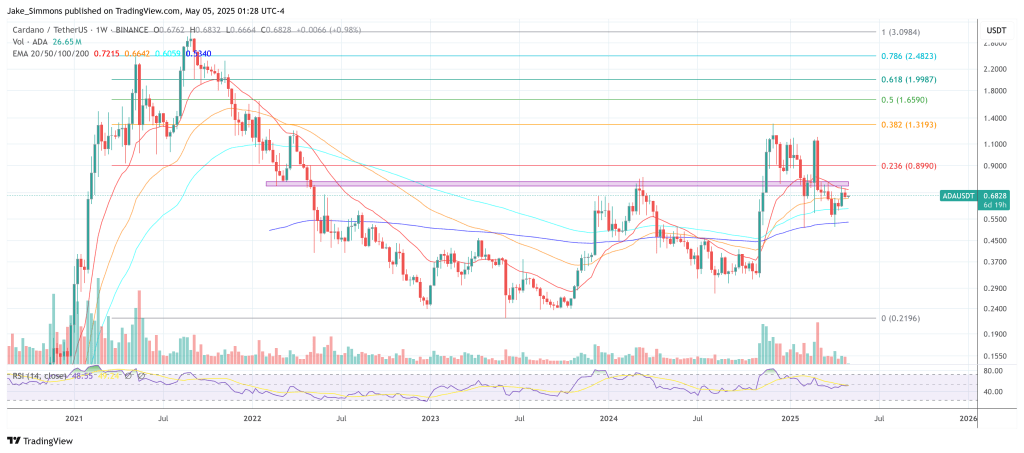In a rather splendid display of forward-thinking, Cardano has decided to join the Linux Foundation’s Confidential Computing Consortium (CCC), elevating itself to the same league as the tech titans Microsoft and Amazon. Yes, it seems the open-source blockchain is not just for geeks anymore, it’s now rubbing elbows with the big boys in the rapidly expanding market for hardware-based data protection. And where did this announcement come from, you ask? Why, from an hour-long “Midnight Booth” fireside chat at Consensus, of course. In attendance were the ever-eloquent Charles Hoskinson, CEO of Input Output (IO), and Eran Barak, CEO of Midnight, who outlined how confidential computing would become the backbone of Cardano’s privacy-first sidechain, Midnight.
“Oh, by the way, we’ve just joined the Confidential Computing Consortium, alongside the likes of Microsoft and Amazon. We’re talking about confidential computing, trusted hardware enclaves, and GPUs for outsourcing AI data,” said Hoskinson to a bemused audience. The CCC is busy setting cross-industry standards for enclave-based security, and with this latest move, Cardano is signaling its intent to align Midnight’s zero-knowledge roll-ups and decentralized-identifier (DID) stack with emerging hardware standards. No more relying solely on cryptographic wizardry—this is about to get real.
“Midnight essentially plugs into all these things, giving you the ability to think about how, who, and when you share data, what you own, and what they own,” Hoskinson continued, with the subtlety of a Shakespearean soliloquy. “It’s about creating a marketplace where you actually get paid for sharing data, instead of having everything funneled to the ‘Magnificent Seven,’ who then decide what scraps you get.” Quite the market disruptor, eh?
Cardano’s Bold Leap Into Secure Blockchain Waters
Hoskinson traced Midnight’s humble beginnings to “a bar in Tel Aviv” during Eurocrypt 2018, where a heated discussion about zero-knowledge proofs gave birth to a sidechain that combines a Stark-based execution engine, a dual-token economic model, and selective-disclosure controls rooted in W3C DIDs. But, as Barak wisely pointed out, technological ingenuity alone won’t cut it; for enterprise adoption, you need trust rooted in hardware. And here’s where confidential computing comes in, supplying that vital layer of security.
“When you think about protecting your data, you need to protect both the data and the metadata,” Barak explained. “Midnight aims to be the fabric that allows AI to access personal data without violating our rights.” By joining the CCC, Cardano now has a seat at the table where chipset specifications, enclave attestation protocols, and open-source reference code are all being woven together like some sort of secure, techy tapestry.
Much of the session revolved around Midnight’s two-asset design, which separates volatile governance tokens (“Knight”) from a stable, non-speculative unit of capacity (“dust”). Hoskinson was quick to point out that this split prevents the regulatory headaches seen in fully shielded currencies like Monero. “It’s like getting your cake and eating it too,” he quipped. “Developers can pay in Bitcoin, Ether, or Solana, and the end user is blissfully unaware of the different systems in play.”
Confidential computing extends this philosophy all the way to the hardware level, where enclave-sealed execution protects wallet keys, zero-knowledge circuits, and DID registries from pesky side-channel attacks. It also allows auditors to verify that regulatory conditions embedded in smart contracts are being met. “Selective disclosure is absolutely necessary,” Hoskinson added, addressing compliance concerns. “We bake in the ability to disclose information at the smart-contract level, and let exchanges decide what’s suitable on a case-by-case basis.” Quite the regulatory savior, it seems.
Cardano’s membership in the CCC comes at a time when discussions are turning to tokenized real-world assets. Hoskinson estimated this market is worth “ten-plus trillion dollars” today, and could balloon to “a hundred trillion” once smaller-cap and frontier-market issuers hop on board. Midnight, he insisted, must seamlessly interact with both legacy systems like the New York Stock Exchange and on-chain liquidity pools. And, naturally, hardware-verified privacy is the key to making this possible. “You want broker-dealers, compliance, and circuit breakers, but you also want blockchain tech… Midnight’s infrastructure is the only way to pull that off,” he said, no doubt with a grin.
Barak revealed that more than 2,000 early builders are already working on Midnight’s testnet, developing everything from dark-pool prototypes to carbon-credit tracking for jet engines. Because both the code and state are encrypted, IO’s own developer-relations team cannot snoop on what’s being deployed. Teams only volunteer information when they opt in. “Once we bring blockchain tech that addresses businesses’ privacy needs, the innovation potential is absolutely mind-blowing,” Barak concluded. Well, it’s certainly a lot to digest, isn’t it?
As we go to press, ADA is trading at $0.68, but you probably already knew that.

Read More
- Gold Rate Forecast
- Silver Rate Forecast
- Honor of Kings returns for the 2025 Esports World Cup with a whopping $3 million prize pool
- Kanye “Ye” West Struggles Through Chaotic, Rain-Soaked Shanghai Concert
- PUBG Mobile heads back to Riyadh for EWC 2025
- USD CNY PREDICTION
- Arknights celebrates fifth anniversary in style with new limited-time event
- Mech Vs Aliens codes – Currently active promos (June 2025)
- Every Upcoming Zac Efron Movie And TV Show
- Superman: DCU Movie Has Already Broken 3 Box Office Records
2025-05-05 12:30